Recently, while browsing online, I stumbled upon a headline suggesting a connection between autism and circumcision. I couldn’t help but chuckle at the absurdity.
Over the years, I’ve encountered a myriad of theories about what causes autism. Some of the more memorable ones include:
- Mercury exposure causes autism.
- Lead exposure is a trigger.
- Autism starts with inadequate maternal bonding.
- Pesticides may play a role.
- The effects of plastics.
- Gluten exacerbates autism spectrum disorders.
- A diet rich in strawberries is beneficial for autistic individuals.
- Automotive exhaust is a significant contributor.
- Chemicals in non-stick cookware might be culprits.
The theory about maternal bonding strikes a personal chord. I struggled to bond with my son, Aaron, when he was an infant. He cried and fussed for what felt like an eternity. While he did sleep through the night briefly, it didn’t last long. My partner, Mark, and I found ourselves arguing more often, feeling the strain on our relationship. Our first child, Leo, who was a year older, seemed to highlight Aaron’s struggles with his easy-going disposition.
Yet, fast forward to today, and I can confidently say that no one shares a deeper bond with Aaron than I do. And guess what? He still has autism.
So here it is—I believe I know what causes autism. Drum roll, please… Aaron has autism because, as his five-year-old brother Leo puts it, he was simply “bornd-ed” with it. I truly believe autism is rooted in genetics. It’s likely that Mark’s DNA and mine combined in a unique way, resulting in a child who perceives the world differently—perhaps with heightened sensitivity to various environmental factors.
As for the strawberry theory, I remain skeptical.
For years, I directed my frustration toward Mark’s family, attributing the autism gene to them. But after attending a family funeral recently, I found myself pondering this notion as I surveyed the room.
Last week, I was in a café when a woman approached me, introducing herself as the mother of a girl in Aaron’s fifth-grade class. I smiled, grabbed my coffee, and turned to leave when she added, “Wait! I wanted to share something with you. My daughter, Lily, mentioned that a boy called Aaron weird in class the other day.”
My heart sank. “Oh, yes, that happens,” I replied.
“Lily told the boy that Aaron isn’t weird. He’s exactly how he’s meant to be,” she said.
This is where my dilemma lies. If I start proclaiming autism as an epidemic, demanding to know its origins and solutions, it contradicts the message of acceptance and understanding that I’ve worked hard to promote. The fragile world we’ve built over the past decade could shatter in an instant.
But there’s no denying that autism is indeed prevalent. Many families will continue to have children, and it would be helpful to understand how to prevent this complex condition from affecting future generations. If it turns out that automotive exhaust is a leading cause, it would be wise to invest in electric vehicles.
Despite my curiosity about the origins of autism, what truly matters to me is who Aaron is. I don’t really care about the causes, but a better understanding could be beneficial.
There’s nothing wrong with him—except perhaps when he spends an entire conversation detailing the various types of gum available at our local Walmart. I wouldn’t change a thing about him, though I might adjust a few aspects of our lives.
I embrace autism and all its unique wonders, even if it means Aaron often talks about gum and Walmart. He is not broken; he is whole. Autism is not anyone’s fault.
Should I stop using Tupperware? Make him eat strawberries, even if he despises them? Repaint the house to ensure no lead is lurking in the walls? Toss out the frying pan? Perhaps I should have cherished him more deeply when he was that tiny, swaddled infant in my arms. Could this somehow be my fault?
As you can see, my emotions regarding Aaron’s autism diagnosis are as intricate as a prism reflecting myriad colors and angles. Some days, my doubts are gentle whispers, while other times they feel like loud proclamations.
I am not a scientist, nor do I claim to be. But as a mother, I have a unique perspective on autism. I recognize the rigidity, the passion for certain interests, and the challenges he faces, especially in educational settings. I understand the disappointment and the yearning that accompanies being different, as I witness it every day.
Living with a child who has autism often leads to the frequent use of the phrase “for now.”
- For now, the radio is tuned to the right station.
- For now, he isn’t screaming.
- For now, he’s sound asleep.
- For now, he’s safe.
So, for now, I choose to believe that Aaron’s autism stems from genetics. I will add vibrant splashes of color to the scientific understanding of autism, blending together the shades of our experiences until a clearer image emerges.
I can’t yet envision what that image looks like, but I like to think of it as a utopia—a harmonious blend of science and humanity. In this place, you’d find strawberries, puppies, and plenty of peppermint gum from Walmart. There would be bright, blonde girls named Lily and boys with glasses named Aaron.
And in the distance, a glass house glimmers on the horizon, radiant in the sunlight. If you look closely, you’d see a phrase etched into the door—a collection of eight powerful words that offer reassurance amidst uncertainty. These words symbolize peace, hope, and acceptance.
I first encountered them in a café while purchasing a cupcake: “He’s exactly the way he’s supposed to be.”
